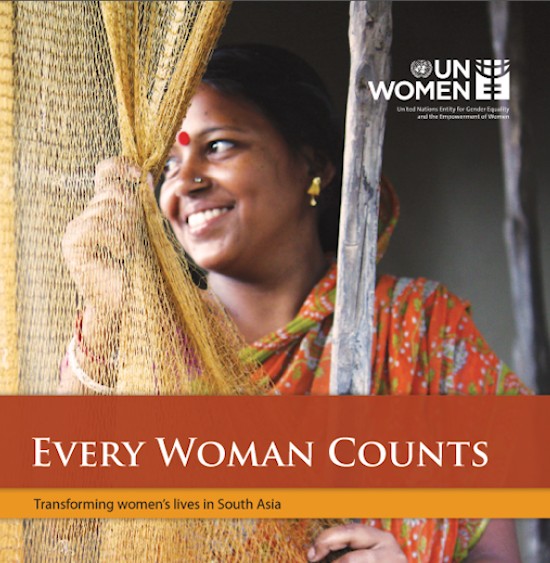
Every Woman Counts

One half of the world’s population is female. Yet in some areas of the world, there is so little that belongs to them. They have limited access to literacy, sanitation and health and to opportunities be this at the level of the individual or the nation. The need, more than ever,is to develop a lasting vision that incorporates the well-being and empowerment of women. Supporting women to reach their true potential is important. To fulfill its universal goals on gender equality and empowerment of women worldwide, the United Nations Entity for Gender Equality and the Empowerment of Women was established by UN Member States in July 2010. With strong advocacy by women’s rights activists, UN Women was created with the intention of improved support to Member States in achieving their goal of equal socioeconomic participation of women.
UN Women works in Afghanistan, Bangladesh, Bhutan, India, Maldives, Nepal, Pakistan and Sri Lanka, supporting these UN Member States to achieve global standards for gender equality. By working with governments and civil society partners, UN Women helps design laws, policies, programmes and services needed to implement and achieve these standards.UN Women advocates equal participation of women in all aspects of life, and focuses on five priority areas:
- Increasing women’s leadership and participation;
- Ending violence against women and girls;
- Engaging women in all aspects of peace and security processes;
- Enhancing women’s economic empowerment; and
- Making gender equality central to national development planning and budgeting.
The creation of UN Women came about as a part of the UN reform agenda, bringing together resources and mandates for a greater impact on the inclusion of women. It merges and builds on the important work of four previously distinct parts of the UN system, which focused exclusively on gender equality and women’s empowerment. This included UNIFEM that was active in South Asia from 1994 to 2010. The other three organisations were:
- Division for the Advancement of Women (DAW)
- International Research and Training Institute for the Advancement of Women (INSTRAW)
- Office of the Special Adviser on Gender Issues and Advancement of Women (OSAGI)
For the last 20 years, UN Women has strived in collaboration with local bodies to ensure the political participation of women in their societies. Whether it is advocating women’s reservation in Nepal’s Constituent Assembly or in Afghanistan’s Loya Jirga, UN Women supports important political changes in the region, by working on key international agreements such as the Convention on the Elimination of All Forms of Discrimination against Women (CEDAW).
From garnering political will to changing social attitudes, it is a combination of policy intervention and social restructuring that will help make societies more gender just.